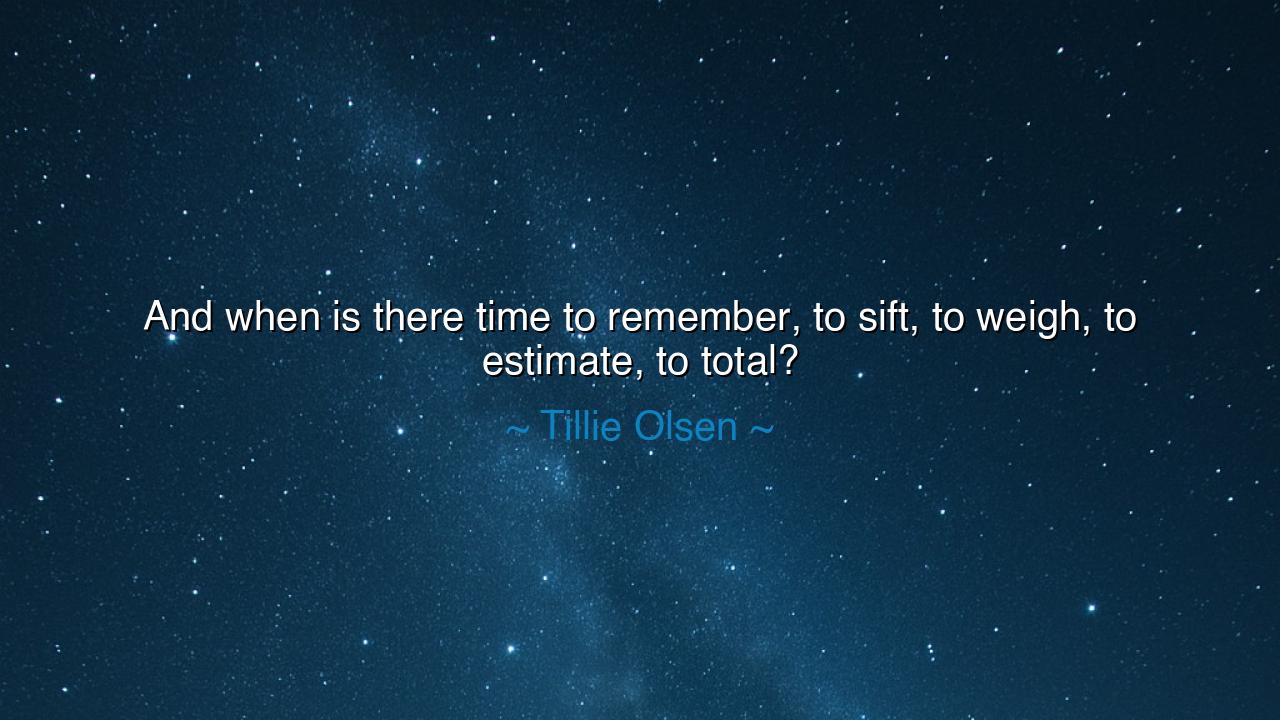
And when is there time to remember, to sift, to weigh, to






The writer and voice of the silenced, Tillie Olsen, once asked in lament: “And when is there time to remember, to sift, to weigh, to estimate, to total?” In these words is not simply a question, but a cry—a cry of the human soul pressed beneath the burden of labor, duty, and survival. She spoke for those who toil endlessly, whose days are consumed by necessity, leaving no space for reflection. For what is life, if not remembered, sifted, and measured for meaning? Yet countless lives pass without such moments, drowned in the relentless tide of daily demands.
The origin of this quote arises from Olsen’s deep empathy for working-class women and mothers, whose voices were too often unheard. In her famous work Silences, she wrote of the creative potential stifled by poverty, by exhaustion, by the endless demands of care. Her words are not abstract philosophy, but testimony born from her own struggles—raising children, working long hours, yearning for time to write, to think, to breathe. Thus she asked, not in bitterness but in truth: when do we find the time to reflect upon the very lives we are living?
The ancients themselves wrestled with this question. The Greeks spoke of bios—life truly lived—and zoe—mere existence. To exist without reflection was to miss the essence of being human. Socrates declared, “The unexamined life is not worth living.” Yet Olsen reveals how the structures of society deny countless souls even the chance to examine their lives. Her question becomes timeless: how many pass through their days without ever pausing to weigh them, because necessity leaves no space for reflection?
History gives us poignant examples. Consider the industrial workers of the 19th century, men, women, and even children, whose every hour was consumed by labor in factories. They built nations with their hands but had no leisure to remember, to weigh, to write their own stories. Their lives, unreflected, became fuel for progress, but their voices were silenced. Or recall the enslaved people of America, who endured relentless toil from sunrise to sunset. How much memory, how much reflection, was stolen from them by the whip of necessity? Yet still, in whispered songs and hidden prayers, they carved moments of remembrance.
The meaning of Olsen’s words is both tragic and instructive. She reminds us that time for reflection is not given freely—it must be protected, fought for, and valued. Without it, we risk becoming creatures of mere function, never pausing to ask what our days mean. And if we cannot weigh, sift, or remember, then life slips through our hands like sand, leaving us weary but not wise, busy but not fulfilled.
Therefore, the lesson is this: do not let the urgent destroy the important. Guard moments of stillness as treasures, for it is in stillness that the soul gathers itself. Remember your days, not only to count them, but to understand them. Sift your choices, weigh your experiences, and total your blessings, lest your life be lived only in fragments. Reflection is not a luxury—it is the very act that turns existence into meaning.
In practice, I counsel this: set aside even small spaces for silence. Rise before the rush, or pause before the night, to write, to think, to remember. Ask yourself: “What did I live today? What do I carry forward?” Keep a journal, breathe in solitude, or speak with one you trust. In these practices, you claim time back from the devouring world, time to total what matters most.
Thus, the wisdom of Tillie Olsen resounds: “And when is there time to remember, to sift, to weigh, to estimate, to total?” Do not wait for time to appear—it will not. Create it, guard it, honor it. For only in remembrance does life become whole, and only in reflection do our fleeting days gain the weight of eternity.






AAdministratorAdministrator
Welcome, honored guests. Please leave a comment, we will respond soon